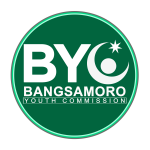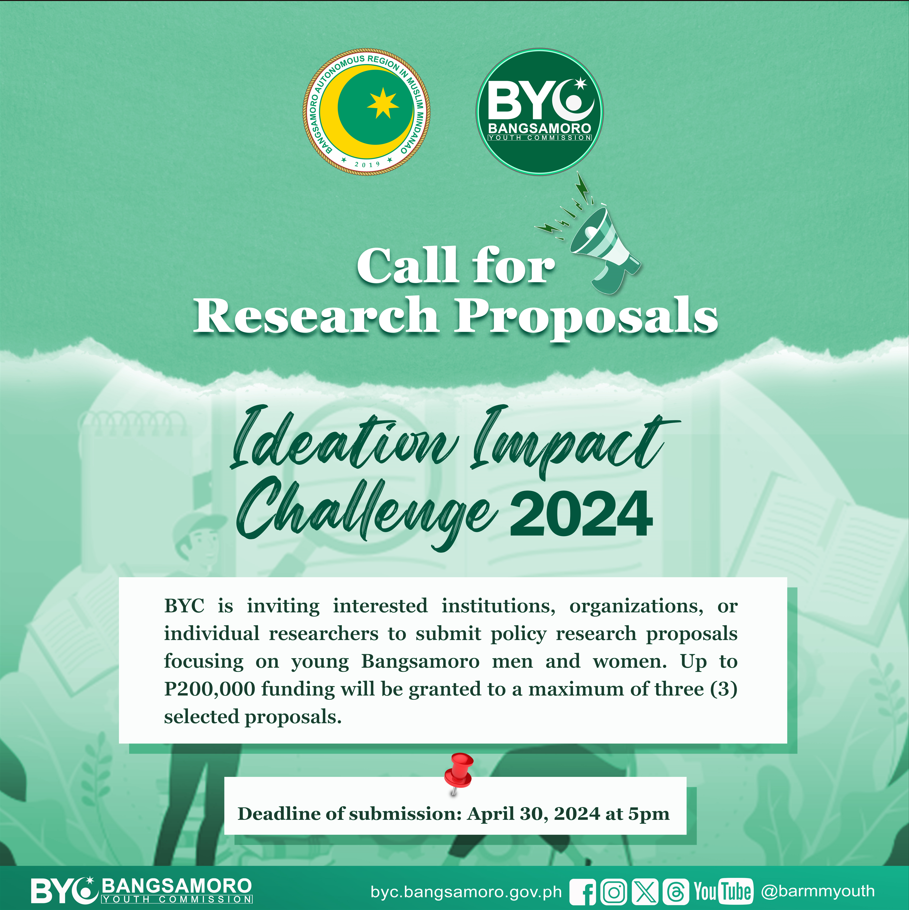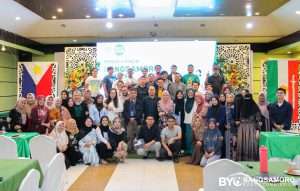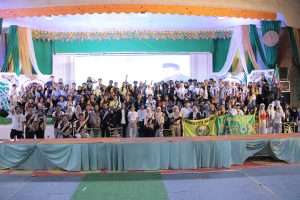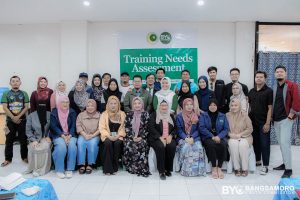IDEATION IMPACT CHALLENGE: CALL FOR POLICY PROPOSALS 2024
ABOUT THE BANGSAMORO YOUTH COMMISSION
Republic Act No. 11054 otherwise known as the Bangsamoro Organic Law states that the Bangsamoro Government shall recognize the vital role of the youth in nation-building, promote and protect their physical, moral, spiritual, and nationalism, encourage involvement in public and civic affairs, and promote mental and physical fitness through sports. Congruent to this, the Parliament shall create by law a commission on youth affairs and shall define its powers, functions, and composition (RA 11054, Article IX, Section 13).
On April 14, 2020, the Honorable Chief Minister signed Bangsamoro Act No. 10, which created and established the Bangsamoro Youth Commission (BYC). It is mandated to be the primary policy-making and coordinating body of the Bangsamoro Government in all matters affecting the youth. Further, the commission ensures compliance therewith by all ministries, agencies, office and other instrumentalities of the Bangsamoro Government that are mandated to implement programs, projects and activities affecting the youth of the Bangsamoro Autonomous Region. By age range, the commission covers young people from 15–40-years old.
The institutionalization of BYC paved the way for a more inclusive and participative Bangsamoro Government for the young people, hence the month of April is considered as the Bangsamoro Youth Commission Month. As of the moment, BYC focuses on realizing the Bangsamoro Youth Transition Priority Agenda (BYTPA) and its recalibrated programs, projects and activities namely, Stakeholders and Partnership Building, Youth Responsive Policy and Program Development, Public Engagement Programs, Monitoring and Evaluation, and Youth, Peace and Security Program.
ABOUT IDEATION IMPACT CHALLENGE
The Ideation Impact Challenge (IIC) seeks to transform ideas into a creative intervention from which the community would benefit through a set of competitive criteria. Ideation, in a broader sense, is the process of coming up with fresh concepts or ideas, frequently in response to a specific opportunity or challenge. Though it is a crucial aspect of the creative process, ideation is merely the first step towards making a genuine difference in the world. Individuals or teams must be able to effectively convert their ideas into action and implement them if they are to have an influence.
Evaluating an idea’s viability and potential is the first stage in turning ideation into action. This entails evaluating the resources needed to realize the idea, such as money, people, and time, as well as any potential risks and difficulties that might appear. This assessment should also take into account the idea’s prospective effects on society as a whole as well as its immediate advantages.
During its initial three years, the IIC of BYC has dedicated its efforts to advancing the economic empowerment of youth in the region. There is an increasing number of young entrepreneurs in the area who are having trouble launching their businesses due to a lack of resources, restricted access to credit and financing, and a lack of opportunities for capacity building. These obstacles limit young people’s ability to launch and expand their own businesses, which prevents them from fully participating in the economy. As a result, it lessens the ability of young entrepreneurs to promote growth, employment, and poverty reduction in the Bangsamoro region and to act as “agents of change” in their communities.
In 2023, the focus of the challenge was on producing four policy research papers with a gender and development lens. These papers aimed to assist offices within the Bangsamoro Government in refining their programs based on research and data analysis. Additionally, the initiative supported the development of four policy research papers.
This year’s IIC will build upon the need for research proposals, particularly focusing on the gender and development lens. The objectives for the call for research proposals related to gender and development are as follows:
- To foster and advance gender-based research: The fundamental objective of the call for research proposal is to attend to the prevalence of out-of-school youth, address the economic distress faced by street vendors, identify the role of young men and women in disaster risk reduction, preservation of the identity and culture of the Bangsamoro in the context of the youth, and Child Early Forced Marriage particularly in Indigenous People’s community.
- To provide evidence-based solutions: The call for research proposals aims to provide a thorough solution backed by evidence and other evidence that will generally address the underlying issues that affect young men and women and small business owners.
- To encourage interdisciplinary research: The call for research proposals encourages interdisciplinary research by inviting researchers from different fields to collaborate on a common research goal and explore the intersections between gender and other social, economic, and cultural factors.
- To promote camaraderie and participation: The call for research proposals aims to promote camaraderie by engaging in research that supports gender empowerment and encourages participation in the decision-making process.
- To promote knowledge sharing: The call for research proposals aims to promote knowledge sharing by disseminating research findings to relevant stakeholders, including policymakers, civil society organizations, and the public.
- To foster collaboration and networking: The call for research proposals provides a platform for researchers with diverse backgrounds to collaborate and establish networks among themselves and others, leading to future partnerships and collaborations that promote gender equity, equality, and social justice.
REQUIREMENTS AND ELIGIBILITY
Research Focus
Through this Call for Proposals, BYC intends to partner with up to three (3) proponents to undertake research to identify and explorethe nuanced challenges faced by young women and men in Bangsamoro and offer solutions to those challenges.
As an institution tasked with creating policies and coordinating with agencies and offices that implement programs and activities for young people, BYC deemed it necessary to conduct this activity for the meaningful realization of its mandate enshrined in the law.
Young men and women of today face a range of challenges in various aspects of their lives. The Bangsamoro youth, who are part of the Bangsamoro Autonomous Region in Muslim Mindanao (BARMM), face unique challenges that are influenced by their cultural and regional context. Bangsamoro young men and women feel pressure to adhere to traditional gender roles and cultural norms that can limit their freedom and opportunities. These norms can restrict their access to education, employment, and decision-making processes.
This Call for Research Proposals aims to uncover the interconnected issues, concerns and challenges which are stumbling blocks for young men and women’s empowerment in communities. Ultimately, the research should explore the enabling environment and initiatives in promoting solutions to the prevalence of out-of-school youth, to address the economic distress faced by street vendors, to identify the role of young men and women in disaster risk reduction, the preservation of the identity and culture of the Bangsamoro in the context of the youth, and Child Early Forced Marriage particularly in Indigenous People’s communities.
RESEARCH METHODOLOGY
Data gathering: Applicants are encouraged to use innovative approaches to data gathering. BYC encourages a human centric approach and welcomes applicants to devise innovative local partnerships, strategies and alternative data collection approaches to gain granular demand-side insights from young men and women and validate these findings. It is important for applicants to consider cost-effective, timely, and yet robust methodologies for data collection.
Surveys and Questionnaires: Surveys and questionnaires are effective in gathering quantitative data from a large sample of young men and women. These can be administered in person or online. You can design structured surveys with closed-ended questions or use open-ended questions for more qualitative insights.
Interviews: Conducting interviews allows for in-depth exploration of topics and the collection of rich qualitative data. You can choose between structured, semi-structured, or unstructured interviews, depending on your research objectives. Interviews can be conducted face-to-face, via phone, or online.
Focus Groups: Focus groups involve bringing together a small group of young men and women to discuss specific topics. It allows for the exploration of shared experiences, attitudes, and perspectives. A facilitator guides the discussion while encouraging participants to express their thoughts and opinions.
Secondary Data Analysis: In some cases, researchers may use existing datasets that include information relevant to their research on young men and women. These datasets can come from government agencies, research institutions, or other sources. Analyzing secondary data can be a cost-effective approach, but it is important to ensure the data is applicable to your research questions.
Online Ethnography: With the prevalence of social media and online communities, researchers can conduct online ethnography to study young men’s and women’s behaviors, interactions, and experiences in virtual spaces. This method involves observing and analyzing online discussions, content, and interactions.
Mixed Methods: Combining multiple data collection methods, such as surveys and interviews, can provide a more comprehensive understanding of young men’s and women’s experiences. This approach allows for the triangulation of data and the exploration of both quantitative and qualitative aspects.
When choosing a data collection methodology, consider the nature of your research questions, available resources, ethical considerations, and the preferences and accessibility of your target population of young men and women.
To apply for this Call for Research Proposals, the research proposed must be a new research which will be undertaken or research which is currently underway. Past research can be used as desk review materials; however, the funding provided by BYC must be used for new or ongoing research aligned with the BYC’s research focus stated above. If the proposal is for research currently underway, a justification must be given as to why additional funding is required and a description of the additionality the funding will offer to the research outcome.
RESEARCH OUTCOME
The research outcome aims to inform policy and practice by providing evidence-based insights and recommendations. This includes identifying best practices, evaluating the effectiveness of existing interventions for young men and women, and generating new knowledge that can guide the development of gender-responsive policies and programs.
The research study produced will be published under BYC’s ownership and copyright, in line with BYC publication guidelines. The data and information of individuals will not be shared publicly and will be anonymized to comply with government privacy standards. The research will contribute to the body of literature on barriers men and women face in accessing governments’ interventions.
It is expected that the publishable research document be no longer than a maximum of 40 pages in length and a minimum of 15 pages. After the research is published, additional related activities, such as workshops, consultations, webinars, and others, may be organized by BYC, in collaboration with the research partner/individual, to further disseminate the research.
WHO CAN APPLY
Applicants are encouraged to create innovative partnerships or coalitions to undertake the research. For example, innovative partnerships could consist of universities or non-profits partnering with accredited youth-led and youth-serving organizations. The lead applicant, must fall into one of the following categories:
- Accredited youth-serving and youth-led organizations
- Government entity
- Academe
- Civil Society Organizations
- Individual researcher (self-employed or affiliated with one of the above entities)
- Private sector institutions
GEOGRAPHIC SCOPE OF RESEARCH
The research must focus on young men and women in one or several of the following provinces: Maguindanao del Sur, Maguindanao del Norte, Basilan with Lamitan City, Sulu, Tawi-Tawi, Lanao del Sur, Special Geographic Areas, and Cotabato City. No other geographic coverage will be considered for funding.
Case studies involving best practices and lessons from other areas can also be drawn on as desk research; however, the research and data collection must be undertaken in one or several of the nine geographical areas mentioned.
RESEARCH ETHICS
Ethical research procedures are critical to ensuring the rights, dignity and anonymity of those who are participating in the research. Furthermore, special precautions and considerations need to be given to vulnerable populations. It is also critical that research subjects are informed of their rights, how the data and any photographs will be used, potential risks, limits of confidentiality, participants right to decline participation and contact persons for questions. The information must be explained in the research subject’s language, both in writing and, if engaging directly, verbally as well.
FUNDING AND SUPPORT
BYC will provide up to Php 200,000.00 in grant funding to each of the three (3) proposals. Grant funds must be used to undertake the research proposed by the institution and/or individual, as articulated in their proposal. Financial proposals shall also include costs such as operational and staff costs, travel, sub grants to partner institutions who are supporting the research process, capacity building and training of researchers, etc. The funds cannot be used to buy infrastructure (such as vehicles) or for lending or investment purposes.
Please note that Php 200,000.00 is the maximum threshold of funding. Proposals will be scored based on value for money and appropriate budgeting standards based on the research objectives. Overbudgeting or inflating costs could result in a reduced evaluation score. Underbudgeting is highly discouraged.
Applicants are also encouraged to demonstrate in the budget proposal their contribution to cost sharing and/or in-kind contributions.
In addition to funding support, BYC is establishing a Research Technical Advisory Group, which will provide technical advice in research design and peer reviews of the research outputs to further validate and quality assure the final research product.
RESEARCH TIMELINE
It is expected that the research commences on 22nd of May, 2024, with the finalized and approved document submitted to BYC by 1st of August 2024. This timeline is set in order to allow for the research to be disseminated and appropriately incorporated into the plans, programs, projects and policies of the Commission and other relevant entities.
MONITORING OF RESULTS
BYC expects to be engaged throughout the research process with mutually agreed dates to check-in, discuss progress and provide support as may be required. Given the short time to complete the research, BYC and its delegated representatives (as appropriate) will monitor progress and request information/updates periodically.
The grantee is required to undertake ethical research practices. The grantee will be required to share data collected through the initiative, within the scope of privacy requirements (anonymization of data if required) and ethical standards.
PARAMETERS OF THE AGREEMENT
Agreement and Duration
The winning applicant is expected to sign a Letter of Agreement (Grant Agreement) with BYC. The payment schedule will be mutually discussed and agreed upon between the winning applicant and BYC. Clear milestones will be established through the agreement to ensure that the funds are being utilized in line with the objectives of the research proposal. Disbursement of project funds will be aligned with the achievement of the agreed milestones and objectives.
Language
The deliverables, as well as all related correspondence exchanged by the organization and BYC, shall be written in English.
ELIGIBILITY REQUIREMENTS AND EVALUATION CRITERIA
Minimum qualification criteria:
The lead applicant must fall into one of 4 categories: not-for-profit organization, government entity, accredited youth-led and youth-serving organization, or individual researcher. For not-for-profit organizations, proof of the organization’s not-for-profit status will be required as part of the application process.
Partner institutions included in the proposal must submit an intent letter stating their intent to partner with the lead applicant of this initiative.
The research must be undertaken in one or several of the following areas: Maguindanao del Sur, Maguindanao del Norte, Basilan with Lamitan City, Sulu, Tawi-Tawi, Lanao del Sur, Special Geographic Areas, Cotabato City.
The research proposal topic should explore the nuanced challenges faced by young men and women in the Bangsamoro and offer solutions to those challenges.
The ultimate end goal of applied research on gender and development is to achieve sustainable and transformative change in gender relations and promote gender equity.
The entity or individual researcher must have proven research experience, this can include big data, focus group, survey, key informant interviews, among others. Desk research, in which no further data gathering was undertaken, will not be considered as adequate expertise.
Other requirements and qualifications:
The research proposal must be clearly presented with sound research methodology, including limitations of the research.
Samples of previous research undertaken by the applicant, on similar topics or using similar research methodologies.
A clear research plan/timeline which meets the timeline requirements set out in Research Timeline section of this guideline. This includes confirmed human resources to cover all planned/required activities.
Structure of the proposal
Please refer to the BYC website for all of the proposal materials. We ask that you download the Proposal Application Form and Budget Proposal, and ensure that the proposal is filled out using the templates provided. The proposal should be returned by email to: [email protected]. Any proposal received NOT following the proposal template or has any alterations to the template will be automatically disqualified.
Additional documents or links to documents may be included at the applicant’s discretion.
Submission of the proposal
Applicants who have any questions regarding the Call for Research Proposals should submit their questions by email to: [email protected].
To submit the final proposal, please send it by email to [email protected] with the subject line: BYC-RESEARCH CHALLENGE
The deadline to submit the proposal is 30 April 2024, 05:00PM. Proposals received after this date will be automatically disqualified. Please ensure your submission is no larger than 10 MB.
Evaluation Process
The decision will follow the following timeline and process:
Only proposals received by 30 April 2024, 05:00PM shall be reviewed and shortlisted.
Shortlisted proposals will be reviewed through an independent Review Committee. All committee members will be required to sign a non-disclosure agreement and all proposal information will be strictly confidential.
Selected proposals will be informed, and administrative partnership/contracting measures will be undertaken by BYC.
The target date for grant awarding will be 21 May 2024.
